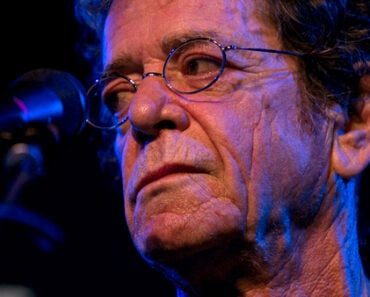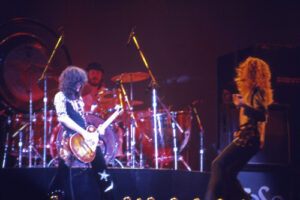# 10 – I Hate Myself For Loving You – Joan Jett
Joan Jett’s “I Hate Myself for Loving You” serves as the powerful opening track for the new list of the 10 Best Rock Songs About Being Used. Released in 1988 as part of her album Up Your Alley, this song became one of Jett’s most successful hits, reaching number eight on the Billboard Hot 100. The song was co-written by Jett and Desmond Child, a renowned songwriter and producer, who had previously collaborated with major rock acts. The track was recorded at Criteria Studios in Miami and Conway Recording Studios in Los Angeles, capturing the raw energy that defines much of Jett’s music. “I Hate Myself for Loving You” has become a defining anthem in her career, embodying the frustration and heartache that comes with loving someone who continually takes advantage of that love.
Read More: Our 10 Favorite Joan Jett Songs
# 9 – The First Cut Is the Deepest – Rod Stewart
Rod Stewart’s rendition of “The First Cut Is the Deepest,” originally written by Cat Stevens, brings a raw, emotional depth to the song’s portrayal of heartache and the challenge of opening up to love after being hurt. Released in 1977 as part of his album A Night on the Town, Stewart’s version became one of his most successful singles, reaching number 1 on the UK Singles Chart and maintaining that position for four weeks. It was recorded at Muscle Shoals Sound Studio in Alabama, a place known for its deep connection to Southern soul and rock. Tom Dowd handled the track’s production, and the song’s instrumental backing featured a signature blend of Stewart’s gravelly vocals, a smooth rhythm section, and a poignant guitar riff that accentuates the bittersweet theme.
Read More: Top 10 Rocking Rod Stewart Songs From The 1970s
# 8 – Dirty Work – Steely Dan
“Dirty Work,” from Steely Dan’s 1972 debut album Can’t Buy a Thrill, presents a story of emotional entanglement, regret, and self-awareness. Written by Donald Fagen and Walter Becker, the song narrates the perspective of a man trapped in an affair with a married woman. He knows he’s being used solely for physical comfort, but he remains caught in a cycle of self-loathing and dependence. Recorded between 1971 and 1972 at ABC Studios in Los Angeles, the album was co-produced by Gary Katz, and “Dirty Work” features David Palmer on lead vocals, giving the track a softer, more vulnerable tone compared to Fagen’s typical sharp, sardonic delivery.
Read More: Steely Dan’s Best Song On Each Of Their Studio Albums
# 7 – Use Me – Bill Withers
“Use Me” is one of Bill Withers’ most iconic tracks, featured on his 1972 album Still Bill. Released as a single, it became a commercial success, peaking at No. 2 on the Billboard Hot 100 chart and No. 1 on the R&B chart. The song’s infectious groove and funky rhythm were enhanced by the tight musicianship of the band, including Withers on guitar and vocals, Ray Jackson on bass, and James Gadson on drums. The song was produced by Withers and Benorce Blackmon and recorded at The Record Plant in Los Angeles, where Withers captured a raw, yet polished sound that showcased his blend of soul, funk, and R&B. A live version of “Use Me,” which is over eight minutes long, opens Withers’ critically acclaimed 1973 Live at Carnegie Hall album, further cementing its place as a fan favorite.
Read More: Top 10 Bill Withers Songs
# 6 – Maggie May – Rod Stewart
“Maggie May” was a game-changing track for Rod Stewart, co-written by Stewart and Martin Quittenton and released as part of his 1971 album Every Picture Tells a Story. Initially the B-side to “Reason to Believe,” radio DJs quickly flipped the script by favoring “Maggie May,” which launched Stewart’s solo career to global success. The track famously combines folk, rock, and a touch of mandolin, played by Ray Jackson of Lindisfarne, creating a unique sound that helped it stand out from other releases of the time. The intro, a 30-second guitar solo called “Henry” by Quittenton, sets the tone for what would become one of Stewart’s most iconic tracks. Recorded at Morgan Sound Studios in London, the song was produced by Stewart himself and released by Mercury Records.
Read More: Complete List Of Rod Stewart Albums And Discography
# 5 – You Didn’t Need – Rollins Band
“You Didn’t Need” by Rollins Band, from their 1992 album End of Silence, stands as an intense and emotionally charged track dealing with betrayal, rejection, and the pain of being used in a relationship. Recorded at Showplace Studios in Dover, New Jersey, in October 1991, this album marked a turning point for Rollins Band, giving them broader exposure with their new label, Imago Records. The album, their most commercially successful release, introduced the band’s uncompromising hard rock sound to a wider audience and established Rollins’ reputation for combining deeply personal lyrics with ferocious musical energy. Produced by Theo Van Rock and engineered by Steve Ett, the album featured Henry Rollins on vocals, Chris Haskett on guitar, Sim Cain on drums, and Andrew Weiss on bass.
Read More: Top 10 Henry Rollins Songs
# 4 – You Oughta Know – Alanis Morissette
“You Oughta Know,” released in 1995, marks a pivotal moment in Alanis Morissette’s career as she transitioned from her earlier pop sound to a raw, angst-filled alternative rock style. Featured on her breakthrough album Jagged Little Pill, the track was co-written with producer Glen Ballard and reflects a sharp shift in Morissette’s artistic direction. The song’s biting lyrics express feelings of anger and betrayal following a tumultuous relationship, setting the tone for the album’s confessional, emotionally intense nature. The song was recorded in Los Angeles and features standout contributions from Red Hot Chili Peppers members Dave Navarro on guitar and Flea on bass, whose gritty instrumentation complements Morissette’s scathing vocals.
Read More: Top 10 Alanis Morissette Songs
# 3 – You’re So Vain – Carly Simon
“You’re So Vain” is one of Carly Simon’s most iconic tracks, released in 1972 as part of her album No Secrets. The song quickly soared to the top of the charts, reaching No. 1 in the U.S., Canada, Australia, and New Zealand. Written over the course of a year, the lyrics tell the story of a self-absorbed lover who is oblivious to his own vanity. Simon has famously kept much of the song’s inspiration a mystery, though she confirmed that one of the men referenced in the song is Warren Beatty. The enigmatic nature of the lyrics has led to decades of speculation about the other men who may have influenced the track. Musically, the song features a memorable bassline by Klaus Voormann and string arrangements by Paul Buckmaster, adding to the song’s dramatic flair.
Read More: Top 10 Carly Simon Songs
# 2 – You’re No Good – Linda Ronstadt
“You’re No Good” became one of Linda Ronstadt’s signature hits, reaching No. 1 on the U.S. Billboard Hot 100 in 1975 and marking a high point in her career. Initially performed by Dee Dee Warwick in 1963 and covered by several artists, including Betty Everett and The Swinging Blue Jeans, Ronstadt’s version from her 1974 album Heart Like a Wheel brought the song mainstream attention. The track was recorded at the Sound Factory in Los Angeles, with Peter Asher serving as the producer. The final version was re-recorded after Ronstadt rejected the first attempt, opting for a more rock-infused groove, largely thanks to guitarist Andrew Gold’s layered instrumental work. Ronstadt’s vocal performance was bold and unapologetic, aligning with the song’s theme of personal liberation and empowerment after a toxic relationship.
Read More: Linda Ronstadt’s Best Song On Each Of Her 1970s Studio Albums
# 1 – Whipping Post – The Allman Brothers Band
“Whipping Post” by The Allman Brothers Band is one of rock’s most intense anthems about emotional torment and betrayal. Written by Gregg Allman, the song first appeared as a five-minute studio version on the band’s 1969 debut album. However, it truly came into its own during live performances, most notably the 22-minute version on the legendary 1971 live album At Fillmore East. This extended performance became a defining moment for the band, allowing them to showcase their improvisational skills and deep blues roots.
Read More: Complete List Of Allman Brothers Band Albums And Songs
Check out similar articles all on ClassicRockHistory.com
10 Musicians We Would Love To See In Ringo Starr’s All Starr Band
10 Artists Whose Follow-Up To Their Biggest Album Was A Bust
25 Great Rock Groups & Artists That Released Only Two Studio Albums
10 Classic Rock Spin Off Bands You May Have Missed
9 Bands That Never Replaced Departed Members
9 Classic Rock Bands Whose Replacement Bass Players Didn’t Last
9 Relatively Unknown Musicians Who Got To Join Supergroups
Read More: Artists’ Interviews Directory At ClassicRockHistory.com
Read More: Classic Rock Bands List And Directory




![Can't Buy A Thrill[LP]](http://m.media-amazon.com/images/I/61joz4YHt9L._SL500_.jpg)









































I would like to add “Night Moves” by Bob Seger and The Silver Bullet Band:
“We weren’t in love, oh no, far from it
We weren’t searchin’ for some pie in the sky summit
We were just young and restless and bored
Livin’ by the sword.
And we’d steal away every chance we could
To the backroom, to the alley, or the trusty woods.
I used her, she used me
But neither one cared
We were gettin’ our share
Workin’ on our night moves”